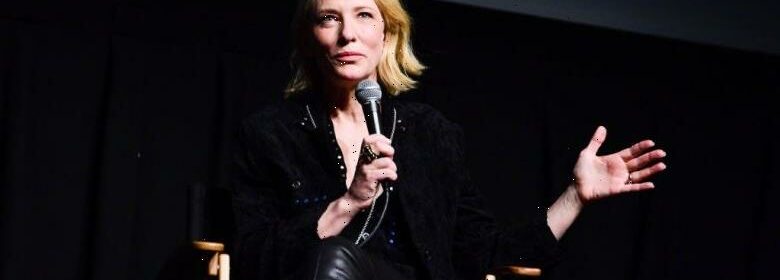Cate Blanchett: TÁR Shows How Legacy Will Be the Death of Your Artistry

On Saturday night, after all 157 minutes of “TÁR” played, and a 20-minute highlight reel of her work was shown, the Telluride Film Festival finally brought out Cate Blanchett for a tribute that included awarding her the Silver Medallion, and having an onstage chat with her about the new film in front of an audience that included Anne Hathaway, Jeremy Strong, James Gray, Karyn Kusama, Paul Mescal, and Phoebe Bridgers.
It was almost fitting to have “TÁR” as the focus of a tribute to Blanchett, given how the film sees her playing a highly accomplished conductor whose world starts to unravel, and actually includes an early scene where her character is also interviewed onstage, having to reflect on her body of work.
What Blanchett herself began to focus on was giving attendees an idea of what happens with performers behind the curtain. “The conductor’s that I spoke to and observed, talked about [an] extreme sense of nerves, and I know that inherently, from having years and years and years working on stage, is that I stand on stage, as I did before I came on here, the worst role you could possibly play is yourself,” said the actress. “I would much rather play Hedda Gabler. That is much easier than playing Cate Blanchett, whoever that is.”
Blanchett called “TÁR,” filmmaker Todd Field’s first release in 16 years, a process film. “I think it’s interesting. You don’t see the performance, you see the process of making something. And that process is indelicate and impolite and full of doubt. And I think that that’s the state that [Lydia Tár] is in personally, as well as professionally.”
She added “the thing that the audience doesn’t see, they think of performers as being supremely confident channels. And performers are riddled with doubt. And that the supreme act of bravery, is coming out and channeling the things through them, not for themselves, but for you guys.” While the enlightening sentiment moved Hathaway to tears, according to a couple of onlookers, Blanchett could not help but add a tag, using a jokingly vulnerable voice to say, “We’re doing it for you guys, it’s all for you.”
Speaking more on “TÁR,” Blanchett shared that she was immediately impressed with how Field’s script depicts an artist in preparation, saying “it was one of the most assured, clear, don’t-need-to-change-a-syllable screenplays that I have ever read in my life,” she also found his directing approach to be a pleasant surprise. “You couldn’t have hoped for a better collaborator than Todd,” said Blanchett. “Even though he’d written the screenplay, I’d say, ‘Wait, hang on, you said this needs to happen, too.’” His response to her would be, “Oh don’t worry about that, the writer wrote that. Don’t worry about it.”
Their collaboration was a long time coming, with Blanchett having been in talks to star in the film Field had been working on with Joan Didion in 2012. “It takes a great deal to get Todd Field to leave his barn to come out and make another movie,” said the actress. “And I think we’re all very grateful that he has done so. But he doesn’t do so unless he has something to say. And he has so much to say in this script.”
One of those things is a statement about legacy, something Lydia Tár is obsessed with. “As an artist, when you get to the top of Mount Olympus, if you’re a genuine artist, you have to blow it all up. Because legacy will be the death of your artistry,” said Blanchett. “So in the end, that’s what I found really noble about the character. But unfortunately, by blowing that up, there’s a lot of casualties. I think that’s the complicated thing about it.”
Source: Read Full Article